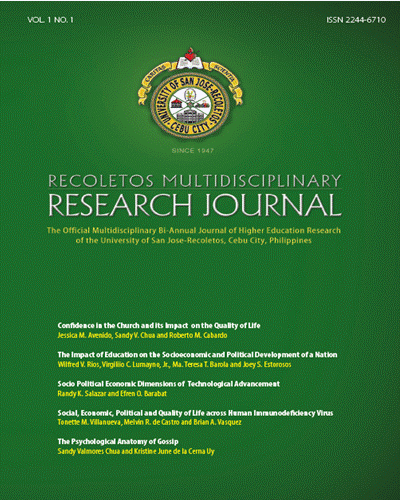The Palm Oil Industry in Southeast Asia: Challenges and Opportunities
DOI:
https://doi.org/10.32871/rmrj1301.01.08Keywords:
Palm Oil, Environmental Scanning, Social Impact PlansAbstract
The study focuses on the palm oil industry which has been a major contributor to the economies of Thailand, Malaysia and Indonesia. These countries have been looked upon as the major players in the industry in the world market. This environmental scanning study assessed the contributions and the challenges posed by the presence of the industry to the countries under study. This qualitative and quantitative study looked into the two trends in the impact assessment with reference to case study examples of some industry players in Thailand, Malaysia, Indonesia and the Philippines. The first part dealt with the increasing focus on the cumulative impacts and the second part on the emerging requirements to link the social and economic impact to the ongoing social impact plans. An analysis on the effects of the industry’s presence within the context of input – output model, proved to have an impact on the environment, socio-economic and political situation and other relevant factors. These effects on education, housing, population, crime rate, local authority funding and quality of life of people in the regional community have led to be the basis for policies and Social Impact Plans for the Southeast Asian countries. An advocacy may be initiated on countries with emerging economies to benchmark from countries which have improved their socio-political and economic conditions considering the positive impact of the industry’s presence.
References
Global Oils and Fat Business, 2008. Malaysia’s Oil Palm – Hallmark of Sustainable Development.Global Oils & Fats Business, 5(4).
Indonesian Palm Oil Development to Accomplish the Indonesian Vision of the Year 2020. OIL PALM INDUSTRY ECONOMIC JOURNAL (VOL. 3 (1)/2003).
Kui, D.P.C.F., 2008. Malaysian Efforts in Developing Responsible Practises in the Palm Oil Industry, edited version of the keynote address by the Malaysian Minister of Plantation Industries and Commodities at the World Sustainable Palm Oil Conference, London. Global Oils & Fats Business Magazine, 5(4).
Lama, Tana, Lee &Rahma. 2009. Malaysian palm oil: Surviving the food versus fuel dispute for a sustainable future, Renewable and Sustainable
Energy Reviews, 13(Volume 13, Issues 6-7, August-September 2009).
MPOC, n.d. The Oil Palm Tree.
S.O. Aghalino. British Colonial Policies And The Oil Palm Industry In The Niger Delta Region Of Nigeria, 1900-1960. African Study Monographs, 21(1): 19- 33, January 2000.
Malaysia’s Oil Palm 2008., – Hallmark of Sustainable Development, Global Oils & Fats Business Magazine, Vol. 5, Issue No. 4;
Suranovic, S. (2010).International trade: Theory and policy. George Washington University.eISBN: 978-1-4533-2732-6. Available online from Flat World Knowledge, Inc.
USDA. (2007), Indonesia: Palm Oil Production Prospects Continue to Grow, Foreign Agriculture Service Commodity Intelligence Report, 31 December, Washington DC.
Villanueva, Jo. (n.d.) Oil Palm Expansion in the Philippines Analysis of Land Rights, Environment and Food Security Issues (in Oil Palm Expansion in Southeast Asia: Trends an Implications for Local communities and Indigenous People by FPP and Sawitwatch, 2011).
Voegele, Erin. (2011)., European Commission announces new voluntary schemes under Renewable Energy Directive. Biodeisel Magazine. July 20, 2011.
Downloads
Published
How to Cite
Issue
Section
License
Copyright of the Journal belongs to the University of San Jose-Recoletos


